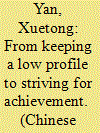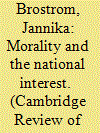| Srl | Item |
| 1 |
ID:
194922


|
|
|
|
|
| Publication |
Bristol, Bristol University Press, 2023.
|
| Description |
x, 250p.pbk
|
| Standard Number |
9781529232615
|
|
|
|
|
|
|
|
|
|
|
|
Copies: C:1/I:1,R:0,Q:0
Circulation
| Accession# | Call# | Current Location | Status | Policy | Location | IssuedTo | DueOn |
| 060581 | 327.101/XUE 060581 | Main | Issued | General | | A1347 | 08-Nov-2024 |
|
|
|
|
| 2 |
ID:
131996


|
|
|
|
|
| Publication |
2014.
|
| Summary/Abstract |
Since 2012, some scholars, both Chinese and foreign, have argued that China's assertive foreign policy is doomed to fail. Nevertheless, after examining China's foreign relations in the last two years, this paper finds that China has experienced improved relations rather than deteriorating ones. In comparison with the strategy of keeping a low profile (KLP), the strategy of striving for achievement (SFA) shows more efficiency in shaping a favorable environment for China's national rejuvenation. The author applies the theory of moral realism to explaining the role of the SFA strategy and argues that morality can increase both international political strength and the political legitimacy of a rising power. The key difference between the KLP and the SFA is that the former focuses on economic gains and the latter seeks to strengthen political support. That is the reason that the SFA values the role of morality and the KLP does not. Due to these different goals, the SFA strategy differs from the KLP strategy in aspects of tenets, general layouts, working approaches, and methods. So far, the SFA has achieved progress beyond people's expectation from Xi Jinping in 2012. Xi's strong leadership may become a new case suitable for illustrating the theory of moral realism.
|
|
|
|
|
|
|
|
|
|
|
|
|
|
|
|
| 3 |
ID:
153920


|
|
|
|
|
| Summary/Abstract |
This article engages with recent scholarship on role of morality in classical realist conceptions of the national interest. It argues that for analytical purposes morality can be linked to notions of power, rather than being explicitly or solely normative. This stems from a re-examination of conversations between classical realists about absoluteness, where morality is treated as a categorical imperative; and about consequences, or the understanding that policy can have both moral and material outcomes. I then conduct a focused analysis of three common strands in the work of Morgenthau, Niebuhr and Kennan that facilitate the development of what might be termed a ‘moral realist’ framework. In doing so, I address the expectations, modes and results of foreign policy choices. This incorporates expectations of reciprocity in state relations, the importance of rational choice and the outcomes of ‘moral’ foreign policy choices. I conclude that moral realism shows some promise as an evaluative tool, and is worthy of further development.
|
|
|
|
|
|
|
|
|
|
|
|
|
|
|
|